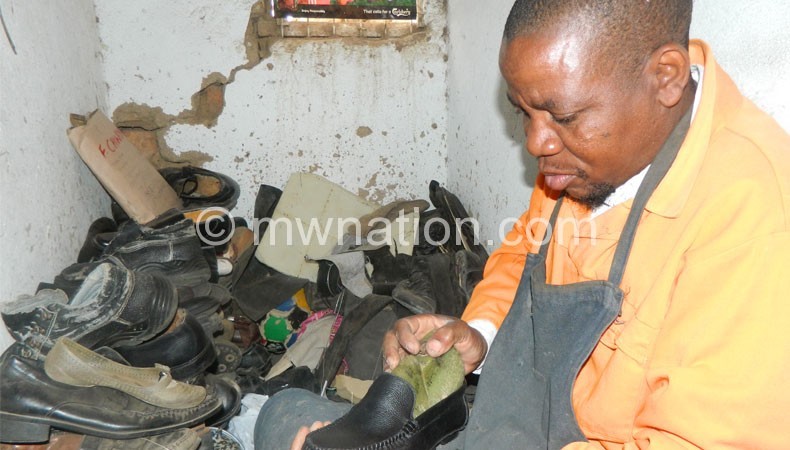Chiwaya: An entrepreneur with passion to train others

Not many entrepreneurs with expertise in a particular field think of imparting the knowledge they have to others. The majority keep the knowledge to themselves as one way of fending off competition and ensuring that their businesses remain relevant.
But 48-year-old Feston Chiwaya, who is in the business of mending and making shoes is an exception.
The entrepreneur, who is based in Ndirande, Blantyre, is teaching many people the art of making shoes.
Chiwaya, who attended Comboni Training Centre in Lunzu, says he believes in sharing skills; hence his passion to train others.
“I believe in sharing knowledge and skills. It is for this that that I take pride in teaching others my experience and what I have acquired from various institutions,” he says.
Chiwaya, who has been in the business since 1996, has so far trained over 10 people in the business.
He is also chairperson of Ndirande Leather Association, a three-year-old association, that caters for up and coming shoes makers around Blantyre.
Chiwaya describes the business he is involved in as profitable.
“With raw materials such as rubber, glue, twine and leather, I am able to make any type of durable shoes ranging from moccasin, safety boots, decent shoes, and school shoes, among others, which I sell at a good price,” he says.
The entrepreneur says the business has transformed his life.
“I dream of opening a big shop in the commercial city of Blantyre where I could operate freely,” he said.
On a good day, Chiwaya says he makes not less than K20 000 in a day and not less than five pairs of shoes when materials are available.
He, however, says lack of trust in locally made products hamper businesses such as his.
“The shoes that we make are even more durable than imported ones but people opt for imported shoes. Fifty years after independence, Malawians should have started supporting and believing in local products, but that is not the case,” Chiwaya says.
He says another challenge is that most customers who buy their shoes do not appreciate the money that is spent in making the shoes, hence want to impose their own prices.
Chiwaya also says it is sometimes difficult to get raw materials for his products.
“There once was a company that was producing leather locally and it was easy and cheap to purchase the material. But its closure has brought a bitter side of the business. We only hope for the re-establishment of this company,” he says.





